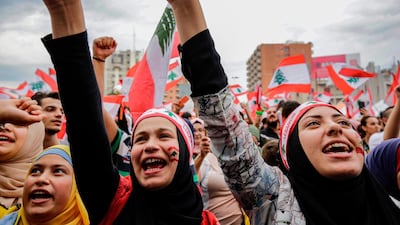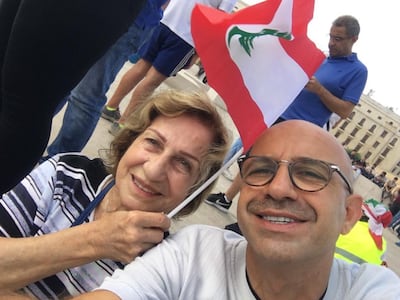I clearly remember the last time we stood together as a people in Lebanon and brought about change. It was more than a decade ago, during the Cedar Revolution of February 2005. I was 12 years old and it was the first time I had taken part in a demonstration. My mother had insisted on taking me and my younger sister along to see history in the making. What drove one million Lebanese citizens onto the streets was the shocking assassination of prime minister Rafik Hariri, whose convoy was blown to pieces in broad daylight by a suicide truck carrying more than a ton of dynamite. It caused nationwide uproar and calls for freedom, sovereignty and independence from the Syrian regime accused of orchestrating Hariri’s killing with the help of its proxies in the country. By April that year, Damascus had withdrawn its forces from Lebanon. We had won – even if it was for a short while.
I was reminded of that moment when, late last Thursday, just as protests broke out, I received a message on our WhatsApp family group that I could not ignore. My sister had sent video footage of Lebanese protesters encircling education minister Akram Chehayeb’s car. Seconds later, gunshots could be heard and the shaky footage switched to the minister's bodyguard, who had leapt onto the hood of the SUV and was firing shots into the air. As my sister and I, now living in the UAE, watched helplessly from afar, we frantically texted friends and family back home.
Soon, fear for their safety gave way to hope. What had started as protests against a new tax on the messaging service WhatsApp had erupted into a nationwide uprising against a corrupt political elite, who have been unable to resolve the country's successive economic woes for the past 30 years.
In the past week, for those of us Lebanese living abroad, time has stood still. Since that fateful evening, nothing else has mattered. We spend our days and nights glued to our smartphones, laptops and television sets, scavenging for information. In a way, we are vicariously living what protesters are calling “the people’s revolution” through our family members and loved ones who have taken to the streets in their masses.
By Sunday, more than one million people had mobilised in a country of just over four million – a quarter of the population. They filled the streets and town squares of the capital Beirut and spread from the northernmost city of Akkar to Naqqoura on the southern border, united as one in speaking out against a sectarian system that has failed us all. There were even reports that inmates of a detention centre in Roumieh, in north-east Beirut, had joined the protests, albeit from their prison cells. Geography, class and religion do not matter in these protests; members of each sect have rebelled against their own leaders. The protesters have been naming and shaming these leaders with chants of "thief", "they must all go" and "everyone means everyone", a heartening show of solidarity at a time of crisis.
Those on the streets represent the full spectrum of society. My teenage brothers flocked to downtown Beirut, together with my 82-year-old grandmother, to add their voices to the call for change. My extended family in Lebanon – from those who, just a few days ago, still supported the parties in power, to those who pay little heed to politics – have turned out en masse. My father sent me a picture of my grandmother, smiling proudly amid a sea of flags in Martyrs' Square, the beating heart of the uprising in central Beirut. For the first time in years, Lebanese people have been able to set aside their differences and join forces to demand the fall of a decaying political class.
Since the end of the civil war in 1990, Lebanon has been ruled by sectarian-based political parties that have effectively run the economy into the ground and helped earn the country the shameful mantle of third-most indebted nation in the world. As a result, the Lebanese state has failed to equip its citizens with basic standard of living. For the past 30 years, people have not had reliable access to electricity and, in some areas, even water. In Beirut, the cost of living for a four-person family is estimated at nearly $3,000 per month before rent while the minimum wage is just $445 per month. One in four Lebanese citizens are unemployed and nearly 40 per cent of those under the age of 25 are out of a job, according to official figures from the Ministry of Labour.
Meanwhile, a shortage of dollars in the country – to which the Lebanese pound is pegged – has pushed workers at petrol stations and bakeries to go on sporadic strikes for the past few months, threatening to bring about a shortage of fuel and a basic commodity. We had accepted these never-ending crises as a fact of life but since last week, the demonstrations have given us hope that things would change for the better and that we are finally ready to reach across sectarian divides.
It was hope that led my parents to move back to Lebanon from France in the mid-1990s. At that time, the late Hariri's government promised to rebuild Lebanon, crushed and devastated after 15 years of bloodshed and destruction. Thirty years later, none of these promises have materialised, while political dynasties continue to thrive. Saad Hariri succeeded his father as leader of the Future Movement, and then as prime minister, twice, while Michel Aoun, the president, has delegated the leadership of his Free Patriotic Movement to his son-in-law Gebran Bassil, who is also foreign minister.
In 2005, my mother took to the streets with her two daughters to witness a rare moment of unity, hoping against all hope that things will change. This week, though, she had to go to Martyrs’ Square without her daughters to accompany and protect her. My sister and I have not lived in Lebanon for nearly a decade, two drops in the sea of a vast diaspora of 14 million people – more than triple the number of Lebanese living in the country. They have been scattering across the globe since the 1800s. Lebanon’s soul is bleeding and this haemorrhaging has yet to stop. It has become intrinsic to resuscitate the economy as remittances make up more than 14 per cent of Lebanon’s global domestic product and many of us have family members relying on our support to make ends meet.
My sister and I were fortunate enough to seek better opportunities abroad. Many of our loved ones are not so lucky and feel trapped in a country that has nothing to offer them. This sense of despair is evident in the words of the protesters. One demonstrator interviewed by the Lebanese broadcaster LBCI wept as he recounted daily hardships. He described himself as an Aounist, a supporter of the Free Patriotic Movement, while his brother supported Samir Geagea's Lebanese Forces, a rival Christian party. Their disparate loyalties came at a high price: the two brothers no longer speak, and he now says it was all for nothing because politicians have failed his family. "My son has a university degree yet he could only find work taking delivery orders at a call centre," he cried. Another protester, a young man from Tyre, spoke with fury towards the Amal movement, which is deeply entrenched in the coastal city: "If we want to achieve our dreams, we must leave the country. Where is the bright future we were promised?"
But migration is not a solution to the country's woes. It is only a band aid and the consequence of the same broken political system that the Lebanese have risen up against. This situation explains in part why so many in the diaspora have felt the urge to take part in the protests, even from afar. From Melbourne to Vancouver, Paris and London to Montreal, the diaspora came together in support of its homeland. In many ways, we migrants are privileged. Many of us have first-world passports that promise the kind of stability and security that would be unthinkable in Lebanon. But we should be able to expect the same from our own country. We should not have been driven out of our homeland because of the incompetence of our leaders, while our families and friends back home must bear to live in substandard conditions.
None of this is normal nor is it fair. Protesters are demanding the resignations of Mr Hariri and his unity government, despite his announcement of sweeping reforms on Monday. In a last-minute bid to clear the streets of protesters, the government promised to tackle corruption, slash the budget deficit and provide round-the-clock electricity. But people fail to be convinced that a political class that has had 30 years to enact change could suddenly resolve Lebanon's economic crisis in 72 hours and weed out the very corruption it has promulgated. If there is one positive outcome from this week, it is that this show of strength has united Lebanese everywhere and reminded us of all that we have in common. It will take more than empty promises to send our people home.



